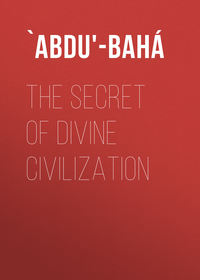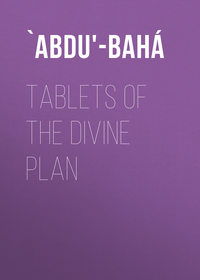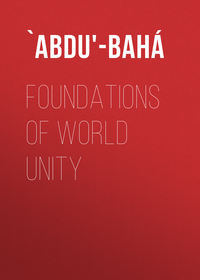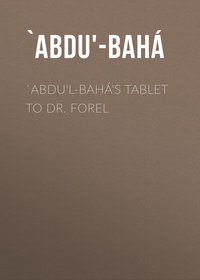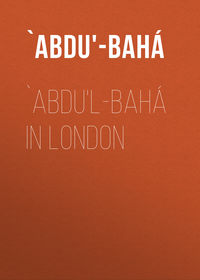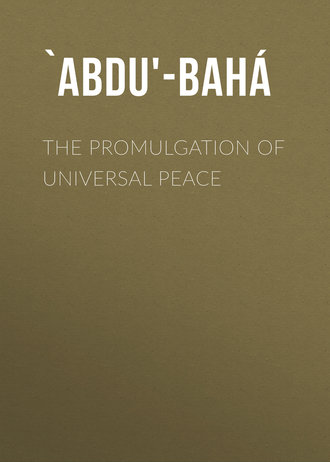 полная версия
полная версияThe Promulgation of Universal Peace
Inasmuch as the fundamental principle of the teaching of Bahá’u’lláh is the oneness of the world of humanity, I will speak to you upon the intrinsic oneness of all phenomena. This is one of the abstruse subjects of divine philosophy.
Fundamentally all existing things pass through the same degrees and phases of development, and any given phenomenon embodies all others. An ancient statement of the Arabian philosophers declares that all things are involved in all things. It is evident that each material organism is an aggregate expression of single and simple elements, and a given cellular element or atom has its coursings or journeyings through various and myriad stages of life. For example, we will say the cellular elements which have entered into the composition of a human organism were at one time a component part of the animal kingdom; at another time they entered into the composition of the vegetable, and prior to that they existed in the kingdom of the mineral. They have been subject to transference from one condition of life to another, passing through various forms and phases, exercising in each existence special functions. Their journeyings through material phenomena are continuous. Therefore, each phenomenon is the expression in degree of all other phenomena. The difference is one of successive transferences and the period of time involved in evolutionary process.
For example, it has taken a certain length of time for this cellular element in my hand to pass through the various periods of metabolism. At one period it was in the mineral kingdom subject to changes and transferences in the mineral state. Then it was transferred to the vegetable kingdom where it entered into different grades and stations. Afterward it reached the animal plane, appearing in forms of animal organisms until finally in its transferences and coursings it attained to the kingdom of man. Later on it will revert to its primordial elemental state in the mineral kingdom, being subject, as it were, to infinite journeyings from one degree of existence to another, passing through every stage of being and life. Whenever it appears in any distinct form or image, it has its opportunities, virtues and functions. As each component atom or element in the physical organisms of existence is subject to transference through endless forms and stages, possessing virtues peculiar to those forms and stations, it is evident that all phenomena of material being are fundamentally one. In the mineral kingdom this component atom or element possesses certain virtues of the mineral; in the kingdom of the vegetable it is imbued with vegetable qualities or virtues; in the plane of animal existence it is empowered with animal virtues—the senses; and in the kingdom of man it manifests qualities peculiar to the human station.
As this is true of material phenomena, how much more evident and essential it is that oneness should characterize man in the realm of idealism, which finds its expression only in the human kingdom. Verily, the origin of all material life is one and its termination likewise one. In view of this fundamental unity and agreement of all phenomenal life, why should man in his kingdom of existence wage war or indulge in hostility and destructive strife against his fellowman? Man is the noblest of the creatures. In his physical organism he possesses the virtues of the mineral kingdom. Likewise, he embodies the augmentative virtue, or power of growth, which characterizes the kingdom of the vegetable. Furthermore, in his degree of physical existence he is qualified with functions and powers peculiar to the animal, beyond which lies the range of his distinctive human mental and spiritual endowment. Considering this wonderful unity of the kingdoms of existence and their embodiment in the highest and noblest creature, why should man be at variance and in conflict with man? Is it fitting and justifiable that he should be at war, when harmony and interdependence characterize the kingdoms of phenomenal life below him? The elements and lower organisms are synchronized in the great plan of life. Shall man, infinitely above them in degree, be antagonistic and a destroyer of that perfection? God forbid such a condition!
From the fellowship and commingling of the elemental atoms life results. In their harmony and blending there is ever newness of existence. It is radiance, completeness; it is consummation; it is life itself. Just now the physical energies and natural forces which come under our immediate observation are all at peace. The sun is at peace with the earth upon which it shines. The soft breathing winds are at peace with the trees. All the elements are in harmony and equilibrium. A slight disturbance and discord among them might bring another San Francisco earthquake and fire. A physical clash, a little quarreling among the elements as it were, and a violent cataclysm of nature results. This happens in the mineral kingdom. Consider, then, the effect of discord and conflict in the kingdom of man, so superior to the realm of inanimate existence. How great the attendant catastrophe, especially when we realize that man is endowed by God with mind and intellect. Verily, mind is the supreme gift of God. Verily, intellect is the effulgence of God. This is manifest and self-evident.
For all created things except man are subjects or captives of nature; they cannot deviate in the slightest degree from nature’s law and control. The colossal sun, center of our planetary system, is nature’s captive, incapable of the least variation from the law of command. All the orbs and luminaries in this illimitable universe are, likewise, obedient to nature’s regulation. Our planet, the earth, acknowledges nature’s omnipresent sovereignty. The kingdoms of the mineral, vegetable and animal respond to nature’s will and fiat of control. The great bulky elephant with its massive strength has no power to disobey the restrictions nature has laid upon him; but man, weak and diminutive in comparison, empowered by mind which is an effulgence of Divinity itself, can resist nature’s control and apply natural laws to his own uses.
According to the limitations of his physical powers man was intended by creation to live upon the earth, but through the exercise of his mental faculties, he removes the restriction of this law and soars in the air like a bird. He penetrates the secrets of the sea in submarines and builds fleets to sail at will over the ocean’s surface, commanding the laws of nature to do his will. All the sciences and arts we now enjoy and utilize were once mysteries, and according to the mandates of nature should have remained hidden and latent, but the human intellect has broken through the laws surrounding them and discovered the underlying realities. The mind of man has taken these mysteries out of the plane of invisibility and brought them into the plane of the known and visible.
It has classified and adapted these laws to human needs and uses, this being contrary to the postulates of nature. For example, electricity was once a hidden, or latent, natural force. It would have remained hidden if the human intellect had not discovered it. Man has broken the law of its concealment, taken this energy out of the invisible treasury of the universe and brought it into visibility. Is it not an extraordinary accomplishment that this little creature, man, has imprisoned an irresistible cosmic force in an incandescent lamp? It is beyond the vision and power of nature itself to do this. The East can communicate with the West in a few minutes. This is a miracle transcending nature’s control. Man takes the human voice and stores it in a phonograph. The voice naturally should be free and transient according to the law and phenomenon of sound, but man arrests its vibrations and puts it in a box in defiance of nature’s laws. All human discoveries were once secrets and mysteries sealed and stored up in the bosom of the material universe until the mind of man, which is the greatest of divine effulgences, penetrated them and made them subservient to his will and purpose. In this sense man has broken the laws of nature and is constantly taking out of nature’s laboratory new and wonderful things. Notwithstanding this supreme bestowal of God, which is the greatest power in the world of creation, man continues to war and fight, killing his fellowman with the ferocity of a wild animal. Is this in keeping with his exalted station? Nay, rather, this is contrary to the divine purpose manifest in his creation and endowment.
If the animals are savage and ferocious, it is simply a means for their subsistence and preservation. They are deprived of that degree of intellect which can reason and discriminate between right and wrong, justice and injustice; they are justified in their actions and not responsible. When man is ferocious and cruel toward his fellowman, it is not for subsistence or safety. His motive is selfish advantage and willful wrong. It is neither seemly nor befitting that such a noble creature, endowed with intellect and lofty thoughts, capable of wonderful achievements and discoveries in sciences and arts, with potential for ever higher perceptions and the accomplishment of divine purposes in life, should seek the blood of his fellowmen upon the field of battle. Man is the temple of God. He is not a human temple. If you destroy a house, the owner of that house will be grieved and wrathful. How much greater is the wrong when man destroys a building planned and erected by God! Undoubtedly, he deserves the judgment and wrath of God.
God has created man lofty and noble, made him a dominant factor in creation. He has specialized man with supreme bestowals, conferred upon him mind, perception, memory, abstraction and the powers of the senses. These gifts of God to man were intended to make him the manifestation of divine virtues, a radiant light in the world of creation, a source of life and the agency of constructiveness in the infinite fields of existence. Shall we now destroy this great edifice and its very foundation, overthrow this temple of God, the body social or politic? When we are not captives of nature, when we possess the power to control ourselves, shall we become captives of nature and act according to its exigencies?
In nature there is the law of the survival of the fittest. Even if man be not educated, then according to the natural institutes this natural law will demand of man supremacy. The purpose and object of schools, colleges and universities is to educate man and thereby rescue and redeem him from the exigencies and defects of nature and to awaken within him the capability of controlling and appropriating nature’s bounties. If we should relegate this plot of ground to its natural state, allow it to return to its original condition, it would become a field of thorns and useless weeds, but by cultivation it will become fertile soil, yielding a harvest. Deprived of cultivation, the mountain slopes would be jungles and forests without fruitful trees. The gardens bring forth fruits and flowers in proportion to the care and tillage bestowed upon them by the gardener. Therefore, it is not intended that the world of humanity should be left to its natural state. It is in need of the education divinely provided for it. The holy, heavenly Manifestations of God have been the Teachers. They are the divine Gardeners Who transform the jungles of human nature into fruitful orchards and make the thorny places blossom as the rose. It is evident, then, that the intended and especial function of man is to rescue and redeem himself from the inherent defects of nature and become qualified with the ideal virtues of Divinity. Shall he sacrifice these ideal virtues and destroy these possibilities of advancement? God has endowed him with a power whereby he can even overcome the laws and phenomena of nature, wrest the sword from nature’s hand and use it against nature itself. Shall he, then, remain its captive, even failing to qualify under the natural law which commands the survival of the fittest? That is to say, shall he continue to live upon the level of the animal kingdom without distinction between them and himself in natural impulses and ferocious instincts? There is no lower degree nor greater debasement for man than this natural condition of animalism. The battlefield is the acme of human degradation, the cause of the wrath of God, the destruction of the divine foundation of man.
Praise be to God! I find myself in an assemblage, the members of which are peace loving and advocates of international unity. The thoughts of all present are centered upon the oneness of the world of mankind, and every ambition is to render service in the cause of human uplift and betterment. I supplicate God that He may confirm and assist you, that each one of you may become a professor emeritus in the world of scientific knowledge, a faithful standard-bearer of peace and bonds of agreement between the hearts of men.
Fifty years ago Bahá’u’lláh declared the necessity of peace among the nations and the reality of reconciliation between the religions of the world. He announced that the fundamental basis of all religion is one, that the essence of religion is human fellowship and that the differences in belief which exist are due to dogmatic interpretation and blind imitations which are at variance with the foundations established by the Prophets of God. He proclaimed that if the reality underlying religious teaching be investigated all religions would be unified, and the purpose of God, which is love and the blending of human hearts, would be accomplished. According to His teachings if religious belief proves to be the cause of discord and dissension, its absence would be preferable; for religion was intended to be the divine remedy and panacea for the ailments of humanity, the healing balm for the wounds of mankind. If its misapprehension and defilement have brought about warfare and bloodshed instead of remedy and cure, the world would be better under irreligious conditions.
Bahá’u’lláh especially emphasized international peace. He declared that all mankind is the one progeny of Adam and members of one great universal family. If the various races and distinct types of mankind had each proceeded from a different original paternity—in other words, if we had two or more Adams for our human fathers—there might be reasonable ground for difference and divergence in humanity today; but inasmuch as we belong to one progeny and one family, all names which seek to differentiate and distinguish mankind as Italian, German, French, Russian and so on are without significance and sanction. We are all human, all servants of God and all come from Mr. Adam’s family. Why, then, all these fallacious national and racial distinctions? These boundary lines and artificial barriers have been created by despots and conquerors who sought to attain dominion over mankind, thereby engendering patriotic feeling and rousing selfish devotion to merely local standards of government. As a rule they themselves enjoyed luxuries in palaces, surrounded by conditions of ease and affluence, while armies of soldiers, civilians and tillers of the soil fought and died at their command upon the field of battle, shedding their innocent blood for a delusion such as “we are Germans,” “our enemies are French,” etc., when, in reality, all are humankind, all belong to the one family and posterity of Adam, the original father. This prejudice or limited patriotism is prevalent throughout the world, while man is blind to patriotism in the larger sense which includes all races and native lands. From every real standpoint there must and should be peace among all nations.
God created one earth and one mankind to people it. Man has no other habitation, but man himself has come forth and proclaimed imaginary boundary lines and territorial restrictions, naming them Germany, France, Russia, etc. And torrents of precious blood are spilled in defense of these imaginary divisions of our one human habitation, under the delusion of a fancied and limited patriotism.
After all, a claim and title to territory or native land is but a claim and attachment to the dust of earth. We live upon this earth for a few days and then rest beneath it forever. So it is our graveyard eternally. Shall man fight for the tomb which devours him, for his eternal sepulcher? What ignorance could be greater than this? To fight over his grave, to kill another for his grave! What heedlessness! What a delusion!
It is my hope that you who are students in this university may never be called upon to fight for the dust of earth which is the tomb and sepulcher of all mankind, but that during the days of your life you may enjoy the most perfect companionship one with another, even as one family—as brothers, sisters, fathers, mothers—associating together in peace and true fellowship.
10 October 1912
Talk at Open Forum
San Francisco, California
Notes by Bijou StraunAlthough I was feeling indisposed this evening, yet owing to the love I entertain for you I have attended this meeting. For I have heard that this is an open forum, investigating reality; that you are free from blind imitations, desiring to arrive at the truth of things, and that your endeavors are lofty. Therefore, I have thought it expedient to discourse upon the subject of philosophy, which is alike interesting to the East and the West, enabling us to consider the analogies and differences between the philosophical teachings of the Orient and Occident.
The criterion of judgment in the estimation of western philosophers is sense perception. They consider that which is tangible or perceptible to the senses to be a reality—that there is no doubt of its existence. For example, we prove the existence of this light through the sense of sight; we visualize this room; we see the sun, the green fields; we use our sense of sight to observe them. The opinion of these philosophers is that such perception is reality, that the senses are the highest standard of perception and judgment, in which there can neither be doubt nor uncertainty. In the estimation of the philosophers of the Orient, especially those of Greece and Persia, the standard of judgment is the intellect. They are of the opinion that the criterion of the senses is defective, and their proof is that the senses are often deceived and mistaken. That which is liable to mistake cannot be infallible, cannot be a true standard of judgment.
Among the senses the most powerful and reliable is that of sight. This sense views a mirage as a body of water and is positive as to its character, whereas a mirage is nonexistent. The sense of vision, or sight, sees reflected images in a mirror as verities, when reason declares them to be nonexistent. The eye sees the sun and planets revolving around the earth, whereas in reality the sun is stationary, central, and the earth revolves upon its own axis. The sense of sight sees the earth as a plane, whereas the faculty of reason discovers it to be spherical. The eye views the heavenly bodies in boundless space as small and insignificant, whereas reason declares them to be colossal suns. The sense of sight beholds a whirling spark of fire as a circle of light and is without doubt as to it, whereas such a circle is nonexistent. A man sailing in a ship sees the banks on either side as if they were moving, whereas the ship is moving. Briefly, there are many instances and evidences which disprove the assertion that tangibilities and sense impressions are certainties, for the senses are misleading and often mistaken. How, then, can we rightly declare that they prove reality when the standard or criterion itself is defective?
The philosophers of the East consider the perfect criterion to be reason or intellect, and according to that standard the realities of all objects can be proved; for, they say, the standard of reason and intellect is perfect, and everything provable through reason is veritable. Therefore, those philosophers consider all philosophical deductions to be correct when weighed according to the standard of reason, and they state that the senses are the assistants and instruments of reason, and that although the investigation of realities may be conducted through the senses, the standard of knowing and judgment is reason itself. In this way the philosophers of the East and West differ and disagree. The materialistic philosophers of the West declare that man belongs to the animal kingdom, whereas the philosophers of the East—such as Plato, Aristotle and the Persians—divide the world of existence or phenomena of life into two general categories or kingdoms: one the animal kingdom, or world of nature, the other the human kingdom, or world of reason.
Man is distinguished above the animals through his reason. The perceptions of man are of two kinds: tangible, or sensible, and reasonable, whereas the animal perceptions are limited to the senses, the tangible only. The tangible perceptions may be likened to this candle, the reasonable perceptions to the light. Calculations of mathematical problems and determining the spherical form of the earth are through the reasonable perceptions. The center of gravity is a hypothesis of reason. Reason itself is not tangible, perceptible to the senses. Reason is an intellectual verity or reality. All qualities are ideal realities, not tangible realities. For instance, we say this man is a scholarly man. Knowledge is an ideal attainment not perceptible to the senses. When you see this scholarly man, your eye does not see his knowledge, your ear cannot hear his science, nor can you sense it by taste. It is not a tangible verity. Science itself is an ideal verity. It is evident, therefore, that the perceptions of man are twofold: the reasonable and the tangible, or sensible.
As to the animal: It is endowed only with sense perception. It is lacking the reasonable perception. It cannot apprehend ideal realities. The animal cannot conceive of the earth as a sphere. The intelligence of an animal located in Europe could never have planned the discovery of the continent of America. The animal kingdom is incapable of discovering the latent mysteries of nature—such as electricity—and bringing them forth from the invisible to the plane of visibility. It is evident that the discoveries and inventions transcend the animal intelligence. The animal cannot penetrate the secrets of genesis and creation. Its mind is incapable of conceiving the verity of ether. It cannot know the mysteries of magnetism because the bestowals of abstract reason and intellect are absent in its endowment. That is to say, the animal in its creation is a captive of the senses. Beyond the tangibilities and impressions of the senses it cannot accept anything. It denies everything. It is incapable of ideal perception and, therefore, a captive of the senses.
Virtue, or perfection, belongs to man, who possesses both the capacity of the senses and ideal perception. For instance, astronomical discoveries are man’s accomplishments. He has not gained this knowledge through his senses. The greater part of it has been attained through intellect, through the ideal senses. Man’s inventions have appeared through the avenue of his reasonable faculties. All his scientific attainments have come through the faculty of reason. Briefly, the evidences of intellect or reason are manifest in man. By them he is differentiated from the animal. Therefore, the animal kingdom is distinct and inferior to the human kingdom. Notwithstanding this, the philosophers of the West have certain syllogisms, or demonstrations, whereby they endeavor to prove that man had his origin in the animal kingdom; that although he is now a vertebrate, he originally lived in the sea; from thence he was transferred to the land and became vertebrate; that gradually his feet and hands appeared in his anatomical development; then he began to walk upon all fours, after which he attained to human stature, walking erect. They find that his anatomy has undergone successive changes, finally assuming human form, and that these intermediate forms or changes are like links connected. Between man and the ape, however, there is one link missing, and to the present time scientists have not been able to discover it. Therefore, the greatest proof of this western theory of human evolution is anatomical, reasoning that there are certain vestiges of organs found in man which are peculiar to the ape and lower animals, and setting forth the conclusion that man at some time in his upward progression has possessed these organs which are no longer functioning but appear now as mere rudiments and vestiges.


